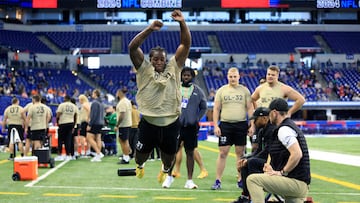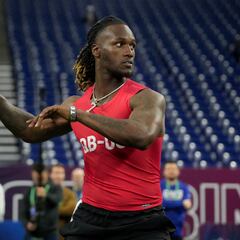Is the NFL Combine still relevant in modern Football?
With more players than ever opting out of the NFL Combine, we take a look at the relevance of the traditional event in the modern game.


In the world of American football, the NFL Combine stands as a pivotal event where aspiring athletes showcase their skills, endurance, and mental acuity to NFL scouts and coaches. Over the years, however, debates have stirred over whether or not this traditional event is relevant in today’s NFL.
When you consider the number of bona fide prospects who are not invited to participate, and then add onto that the growing trend of top players opting out of the combine altogether, you can understand why this event is seeing it’s gleam tarnished.
Meant to serve as a comprehensive platform for evaluating players’ physical attributes and skills, providing valuable insights into players’ speed, strength, agility, and endurance through various drills and exercises, the rise of analytics and advances in technology provide perhaps better metrics for scouts to use in their assessment of a player.
Example No. 1589 of how bizarre the NFL Combine is… pic.twitter.com/Z73ESgysLv
— Curt Weiler (@CurtMWeiler) March 1, 2024
This year, there were a number of top players opted out, including the two players who are most often named when talking about first overall draft picks. USC quarterback Caleb Williams and LSU quarterback Jayden Daniels decided that the combine offered them no gain, and potentially only loss when it comes to the draft.
“I played around 30-something games I believe,” said Williams. “Go ahead and watch real live ball of me and see how I am as a competitor.”
Ohio State wide receiver Marvin Harrison Jr. also decided to forego the combine, choosing instead to focus entirely on football rather than try to squeeze an extra inch out of a broad jump or shave a hundredth of a second off of his 40.
And this brings up another wrinkle. The fact that the drills at the NFL Combine are not football specific. Often, they are not even football relevant. One agent told an ESPN reporter that the 40-yard dash was “archaic, outdated and doesn’t translate for all positions.”
Tennessee QB Joe Milton III knew he had it right on the money 💸 (via @LanceZierlein)
— NFL (@NFL) March 3, 2024
📺: 2024 #NFLCombine continues today at 1pm ET on NFL Network
📱: Stream on #NFLPlus pic.twitter.com/D4trFWXe7R
Matt Gates, co-owner of XPE Sports, a Fort Lauderdale-based company in Florida that specializes in NFL combine training, says, “I struggle with this. I feel the combine is necessary, but it’s not a completely football specific event.”
Related stories
All 32 NFL teams make use of tracking data, both from practice and game days to understand their players’ performance. This tracking data provides better insight than any on-field drill could.
Ironically, some NFL coaches and scouts have argued in favor of the combine, citing not the physical performance data but rather the mental. The will to compete that a player demonstrates simply by showing up and taking part is as telling as anything else. Miami Dolphins general manager Chris Grier said, “Doing the workouts, you see who’s competitive. So for me, the guys that do all the drills, I always like that because that shows this guy is here to compete.”


Complete your personal details to comment